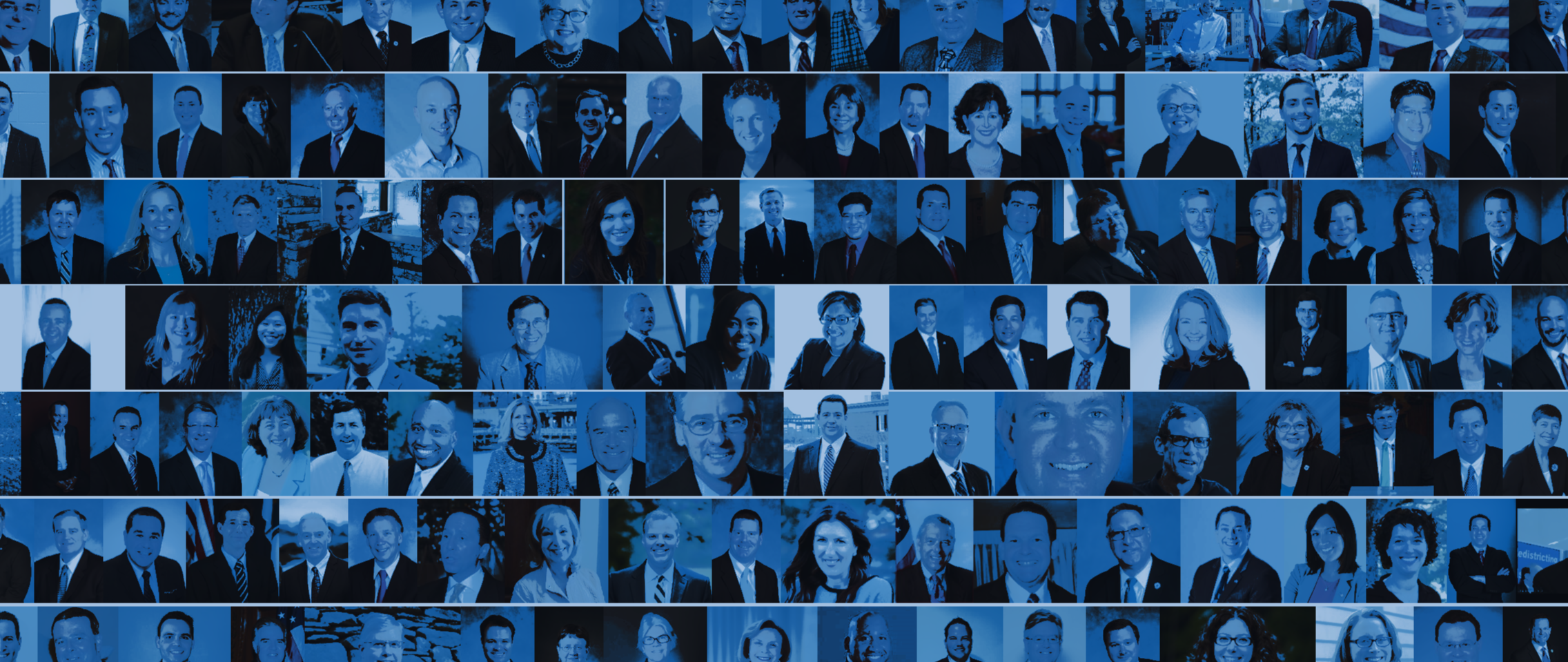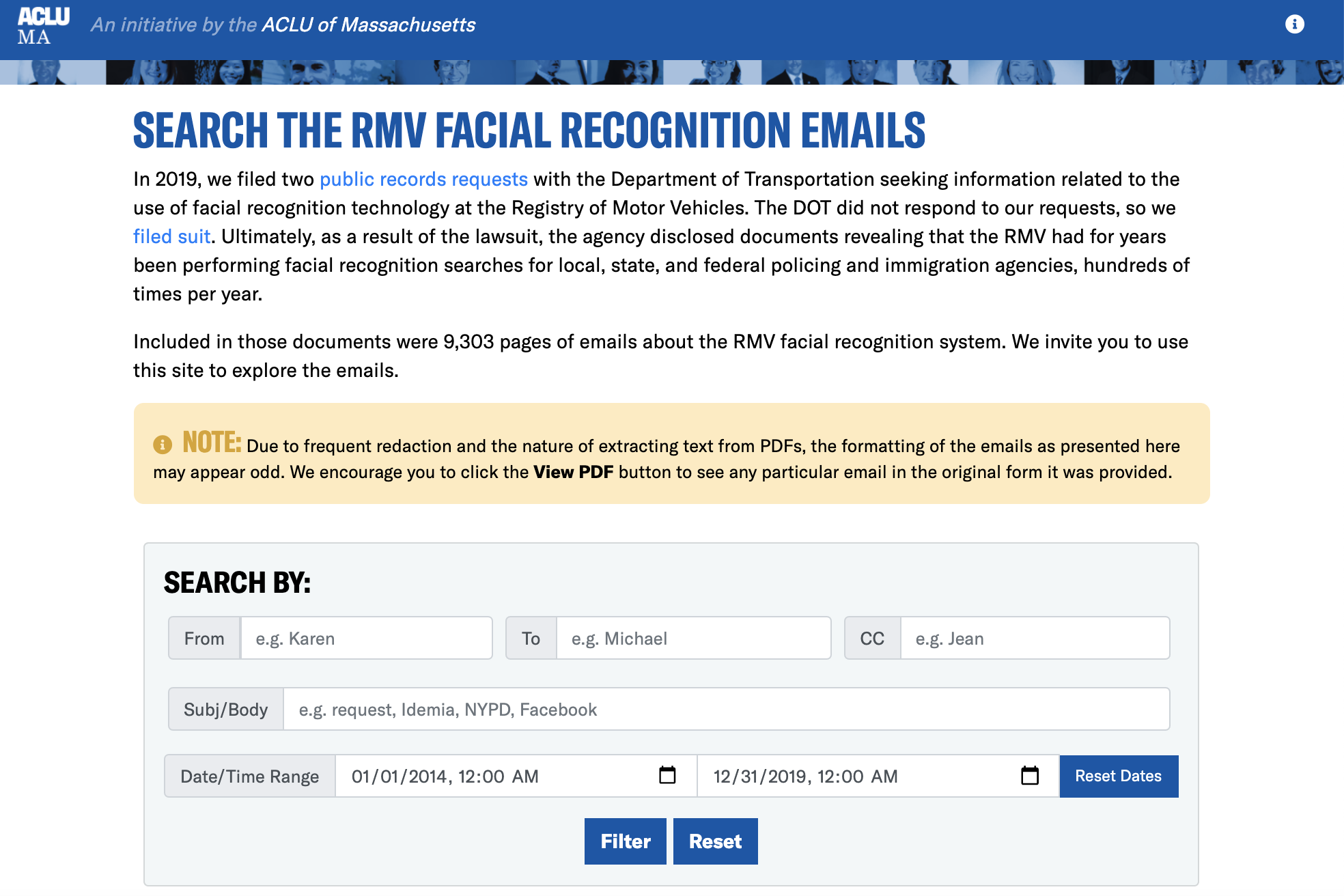DEA and FBI Use of Face Surveillance Technology
Background
In January 2019, in support of the ACLU of Massachusetts’ Press Pause on Face Surveillance campaign, the ACLU of Massachusetts and the National ACLU filed a Freedom of Information Act (FOIA) request with the Drug Enforcement Administration (DEA) and the Federal Bureau of Investigation (FBI) to learn about how these agencies use face surveillance and other remote biometric surveillance technologies. The request also seeks information about the FBI and DEA’s relationships with private corporations that manufacture and sell remote biometric surveillance tools.
In October 2019, the ACLU of Massachusetts and the National ACLU filed suit to force the government to disclose the records. As of June 2020, that lawsuit is ongoing. Please check back periodically; we will update this page with new records over the coming months.
| Request Submitted To | DEA and FBI |
| Category | Surveillance |
| Year Filed | 2019 |
| Number of Documents Received | Ongoing production |
Responsive Documents
| # | File Name | Description | File Type | File Size |
| 1 | 20-00004-L emails | Emails | 17 MB | |
| 2 | 20-00004-L-Consult emails | Emails |
1 MB |
Private Companies
A number of the public records requests we have filed around facial recognition technology deal with the relationships between Massachusetts government entities and private tech companies. Such companies include:
- Clearview AI
- Lan-Tel Communications
- DataWorks
- MorphoTrust
- IBM
- Briefcam
- COPLINK
Clearview AI
A dystopian face recognition tool that drew ire in 2019 for using images that are illicitly scraped from social media platforms as its training data. After learning that Clearview markets aggressively to law enforcement agencies, the ACLU of Massachusetts filed public records requests with every police department in the state to learn about their interactions with Clearview.
See all 340+ requests sent to Massachusetts police departments about Clearview AI here.
Lan-Tel Communications
An IT, communications, and security company that provides surveillance cameras and video analytics technology.
| Date | Agency/Organization | Page |
| July 2019 | City of Boston | Lantel at the Boston Office of Emergency Management |
| October 2019 | Massachusetts Executive Office of Health and Human Services (EOHSS) | Lantel at the Executive Office of Health and Human Services |
| October 2019 | Massachusetts Executive Office of Public Safety and Security (EOPSS) | Lantel at the Executive Office of Public Safety and Security |
| October 2019 | Massachusetts Executive Office for Administration and Finance (EOAF) | Lantel at the Executive Office for Administration and Finance |
| October 2019 | Massachusetts Bay Transportation Authority (MBTA) | Lantel at the Massachusetts Bay Transit Authority (MBTA) |
| October 2019 | Massachusetts State Police (MSP | Lantel at the Massachusetts State Police |
DataWorks
A procurement and inventory management system that has previously sold facial recognition technology to police departments in Chicago and Detroit.
| Date | Agency/Organization | Page |
| August 2019 | Massachusetts Executive Office of Public Safety and Security (EOPSS) | DataWorks at the Executive Office of Public Safety and Security |
MorphoTrust (now IDEMIA)
A company that provides identity tracking and facial recognition software to many government agencies, including TSA.
| Date | Agency/Organization | Page |
| May 2019 | Massachusetts Executive Office of Health and Human Services (EOHSS) | Morpho at the Executive Office of Health and Human Services |
IBM
A national technology company that develops facial recognition technologies.
| Date | Agency/Organization | Page |
| February 2020 | Springfield Police Department | IBM at the Springfield Police Department |
Briefcam
A company that provides video analytics software, including face recognition.
| Date | Agency/Organization | Page |
| August 2019 | City of Boston | Briefcam at the City of Boston (2019) |
| May 2020 | City of Boston | Briefcam at the City of Boston (2020) |
COPLINK
A crime analytics platform developed by Forensic Logic that facilitates data sharing across agencies.
| Date | Agency/Organization | Page |
| 2019-2020 | Massachusetts State Police | COPLINK Facematch at the Massachusetts State Police |
Facial Recognition in Massachusetts
Between 2019 and 2020, the ACLU of Massachusetts has filed over 400 public records request regarding the use of facial recognition technology across the Commonwealth.
1,403
government documents
We have split the requests up into five themes, which we invite you to explore in more detail: State Agencies, Private Companies, Schools, Surveillance in Boston, and Town & City Police.
Not sure where to start? Here are some recommended highlights to explore:
To search all face recognition related requests, we have also created an index documenting all requests we have made by date, topic, and agency:
MA Dept. of Public Health COVID-19 Response
Background
On April 2, 2020, the ACLU of Massachusetts and Harvard Law School’s Center for Health Law and Policy Innovation wrote to the Massachusetts Department of Public Health (DPH) to address equity and privacy concerns pertaining to the DPH’s COVID-19 pandemic response. The inquiry focused on racial disparities, personal protective equipment and ventilator access, testing availability, and patient privacy. It specifically requested records pertaining to (1) the development, effectiveness, and implementation of the March 18 policy which directed boards of health to share patient addresses with first responders, and (2) equipment distribution.
| Request Submitted To | Massachusetts Department of Health |
| Category | Public Health |
| Year Filed | 2020 |
| Number of Documents Received | 5 |
Responsive Documents
| # | File Name | Description | File Type | File Size |
| 1 | 950-CMR-32.08-SPR-Appeals-Effective-January-1-2017 | MA Regulations on Appeals to Public Records Requests | 150 KB | |
| 2 | ACLU responsive docs (2) | Emails regarding the sharing of COVID patient addresses | 5.4 MB | |
| 3 | Acute Care Hospital Vent Tracking Sheet no numbers | Template of spreadsheet tracking ventilator usage in 67 MA hospitals | XLSX | 18 KB |
| 4 | Hospital Ventilator Worksheet (1) | Questionnaire for collecting data regarding ventilator usage at hospitals | XLSX | 12 KB |
| 5 | DRAFT MA Ventilator Distribution Procedure 3.29.20 | Draft Procedure to Maximize the Effectiveness of Ventilator Distribution Across States | DOCX | 39 KB |
Face Recognition in Revere Public Schools
Background
The ACLU of Massachusetts is concerned about the use of facial surveillance technologies in public places including schools. In late 2019 we learned that some schools in Revere were using a technology called LobbyGuard to photograph school visitors. Concerned that the technology could include facial recognition, we filed a request with the Revere Public Schools to learn more. According to the documents, LobbyGuard does not use facial recognition technology. Nonetheless, the technology raises significant concerns related to privacy, racial justice, and immigrants rights.
| Request Submitted To | Revere Public Schools |
| Category | Surveillance |
| Year Filed | 2019 |
| Number of Documents Received | 22 |
Responsive Documents
| # | File Name | Description | File Type | File Size |
| 1 | Lobbyguard_Redacted | Revere Public Schools officials’ emails regarding LobbyGuard | 4.1 MB | |
| 2 | Facial-Recognition_all_Redacted | 12 documents containing Revere Public Schools officials’ emails regarding facial recognition technology | ZIP | 47.7 MB |
| 3 | VisitorManagement_all_Redacted | 9 documents containing Revere Public Schools officials’ emails regarding visitor management systems | ZIP | 21.7 MB |
State Audit of Bristol Sheriff
Background
In March 2019, ACLUM submitted a public records request to the Bristol County Sheriff’s Office (BCSO). Among other things, the request sought information about a recent state audit of the BCSO, various financial records, social media records and policies, and communications between the BCSO and the White House and Secret Service. After BCSO did not provide a timely response, ACLUM engaged the law firm Foley Hoag LLP to seek the records on its behalf. The BCSO ultimately produced records between May and September 2019, including correspondence between Sheriff Hodgson and White House advisor Stephen Miller.
On December 4, 2019, Boston Globe columnist Yvonne Abraham published a piece examining what these email records reveal about the relationship between Bristol County Sheriff Hodgson and the White House.
| Request Submitted To | Bristol County Sheriff’s Office |
| Category | Law Enforcement |
| Year Filed | 2019 |
| Number of Documents Received | 1069 |
Responsive Documents
| # | File Name | Description | File Type | File Size |
| 1 | BCSO 05.02.00 Information Technology System | BCSO Information Technology System Policy | 7.8 MB | |
| 2 | BCSO 05.03.00 Social Media Policy | BCSO Media Relations Policy | 2.5 MB | |
| 3 | Email dated November 20, 2018 relating to Audit | Email relating to audit | 76 KB | |
| 4 | Letter from Sheriff Hodgson to OSA dated November 15, 2018 | Letter to Office of the State Auditor | 217 KB | |
| 5 | Messages to or from Twitter account @BCSO1 | Screenshots of DMs to/from @BCSO1 Twitter Account | 18.2 MB | |
| 6 | Miscellaneous communications between Sheriff or staff and White House or Secret Service_Redacted_part1 | Emails between BSCO Staff & White House/Secret Service – Part 1 | 40.5 MB | |
| 7 | Miscellaneous communications between Sheriff or staff and White House or Secret Service_Redacted_part2 | Emails between BSCO Staff & White House/Secret Service – Part 2 | 28.3 MB | |
| 8 | Travel_all | Scans of 30 PDFs related to BCSO travel | ZIP | 113.2 MB |
| 9 | OSA_emails_all | 168 documents containing emails and attachments between BCSO and the Office of the State Auditor | ZIP | 144.8 MB |
| 10 | WhiteHouse_SecretService_emails_all | 863 documents containing emails and attachments between BCSO and the White House or Secret Service | ZIP | 1.39 GB |
| 11 | Records Produced on September 20, 2019 2_Redacted | Screenshots of Sheriff Hodgson’s Twitter activity | 43.7 MB |
Use of Robotics in Law Enforcement
Background
The ACLU of Massachusetts was made aware of a Massachusetts State Police Facebook post describing an event to be held on July 30, 2019 regarding the use of robotics in law enforcement operations. In response, the ACLU of Massachusetts filed a public records request in August 2019 seeking information about plans for, acquisition of, and/or use of robotics by Massachusetts State Police. The request examined the MSP relationship with the following companies: Ghost Robotics, iRobot, Endeavor, and Boston Dynamics.
| Request Submitted To | Massachusetts State Police |
| Category | Law Enforcement |
| Year Filed | 2019 |
| Number of Documents Received | 7 |
They said…
- No written response received.
Responsive Documents
| # | File Name | Description | File Type | File Size |
| 1 | Emails 2015-2019 redacted_Redacted1 | Emails | 17.4 MB | |
| 2 | Memorandum of Agreement-Department of Fire Services | Scan of Memo of Agreement between Dept. of Fire Services and MSP Bomb Squad | 130 KB | |
| 3 | Endeavor Robotics1 | Scans of fiscal records | 3.2 MB | |
| 4 | Recon Robotics4 | Scans of fiscal records | 2.2 MB | |
| 5 | Recon Robot Proposal 2018 | Project Justification Proposal for MSP | 117 KB | |
| 6 | Remotec Inc. fiscal file2 | Scans of fiscal records | 1.4 MB | |
| 7 | South Shore Divers Fiscal3 | Scans of fiscal records | 1.8 MB |
Surveillance Cameras and Associated Technologies in the Metro Boston Area
Request Submitted To: City of Boston Office of Emergency Management
Category: Surveillance
Year Filed: 2019
Background
Since 2003, the City of Boston and surrounding cities and towns have been designated as an “Urban Areas Security Initiative” (UASI) region by the federal Department of Homeland Security. This UASI designation enables the City and the larger Metro Boston Homeland Security Region (MBHSR) to apply for and obtain federal grants for information sharing, surveillance, emergency preparedness, police and first responder communications, and other technologies and staffing.
The cities and towns included in the MBHSR are Boston, Brookline, Cambridge, Chelsea, Everett, Quincy, Revere, Somerville and Winthrop. Since 2003, the region has received hundreds of millions of dollars through the UASI grant program. These funds are distributed through the Office of Emergency Management in Boston, which also coordinates regional planning meetings, technology acquisitions and development, and regional training exercises, among other efforts.
In July 2019, the ACLU sent an information request to the Office of Emergency Management, to learn more about region-wide surveillance networks.
In bullet form, insert relevant documents.
Boston Police Collaboration with ICE
Request Submitted To: Boston Police Department
Category: Immigration
Year Filed: 2019
Background
The ACLU of Massachusetts and Greater Boston Legal Services filed a public records request in March 2019 seeking information about a joint “task force” between the Boston Police Department (BPD) and Immigration and Customs Enforcement (ICE). The request followed a U.S. Department of Labor complaint alleging that two BPD officers—one of them a member of a “BPD-ICE task force”—were instruments of an employer’s unlawful retaliation against an injured worker. The City’s response, received October 2019, and described in this WBUR story, includes a 2014 Memorandum of Understanding between the BPD and ICE and emails between federal officials and the BPD during parts of 2017 and 2019.
Request to MA Dept. of Public Utilities on Towing Profits
Request Submitted To: Massachusetts Department of Public Utilities
Category: Law Enforcement
Year Filed: 2019
Background
Massachusetts residents incur significant costs as a result of public-authority-ordered involuntary tows. To some degree, costs are controlled by statute and Department of Public Utilities (DPU) regulations. However, these regulations still allow tow companies significant discretion to charge fees above the statutory maximum and also unregulated fees (such as administrative fees). And DPU has repeatedly found that tow companies overcharge. ACLUM filed a public records request with DPU to aid us in determining just how much people pay to retrieve their vehicles from storage facilities after involuntary tows. What we found was that in 2017 and 2018, people paid on average $305. We also found that some companies can make upwards of $1,000 per tow.




